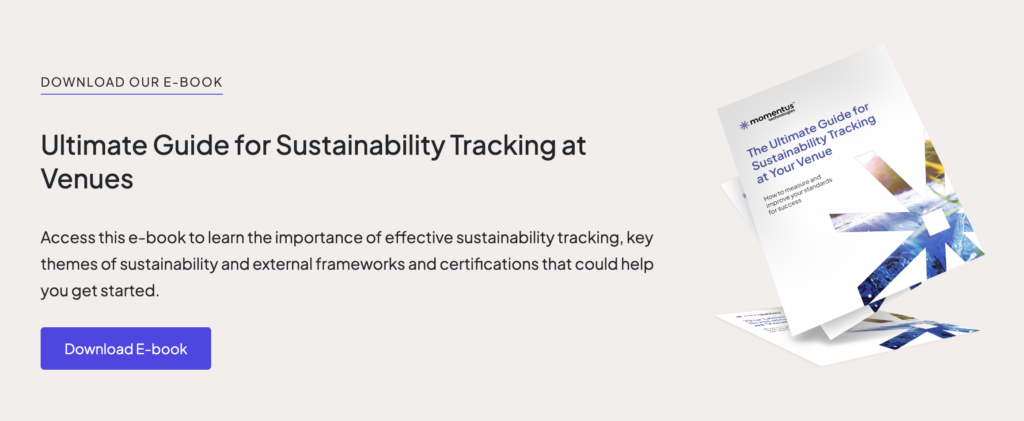The Importance of Sustainability Tracking for Event Venues

It is widely understood that the world simply cannot go on consuming resources the way we have been for the last 30 years. Everyone must do their part to massively reduce consumption and follow the guiding principles for reducing waste: refuse, reduce, reuse, recycle!
Nevertheless, venue and events especially face an unavoidable environmental impact. Both leave a mark on the communities in which they operate due to building size, international travel, fan consumption, and a large workforce. From carbon emissions and plastic waste to legacy, human rights and diversity standards, consumers are demanding that major venues and events must responsibly track their impact on the world around them.
According to Allied Market Research, the green technology and sustainability space is growing by 24.3% annually — valued at $8.8 billion in 2019 and projected to reach $48.4 billion by 2027. So, it is clearly a huge financial mistake for organizations in our industry not to pursue, track and publish their sustainability efforts.
What Are The Benefits of Sustainability Tracking?
Sustainability tracking done well brings many benefits, including:
- Engage your team in sustainability efforts.
- Report on your achievements for stakeholders.
- Demonstrate your achievements to visitors and fans.
- Adhere to government regulations.
- Empower an equal and diverse workforce.
What Sustainability Metrics Should You Track?
1. Environment
Environmental sustainability involves taking actions to conserve resources, protect ecosystems and support the current generation to preserve the health, well-being and surroundings of future generations. The obvious starting point is to measure the overall carbon footprint of your venue as this can become a useful headline metric that encompasses your entire environmental sustainability strategy.
2. Legacy
Legacy is the long-term impact of a major event on the host area: this is as broad as it sounds, incorporating cultural, economic, social, environmental, physical and sporting considerations. Some metrics are harder to track than others — how do you pinpoint medium to long-term economic impacts arising directly from a major event? Nevertheless, venues should consider key metrics like participation (e.g. in grass-roots level sport), the post-event use of new infrastructure built for the event, the impact on the environment, job creation, and education.
3. Corporate Social Responsibility
Corporate social responsibility (CSR) includes environmental impact and similarly large societal concerns, but it also covers internal governance: working conditions, gender balance, anti-corruption and more. This is vitally important because, for large, impactful venues, sustainable global development is more important than a single-minded focus on profit — as your customers and stakeholders are demanding.
To track CSR effectively, you must approach it from an internal and external perspective. Tracking areas like gender pay equality and maternity leave policies will make your organization a better, healthier place to work for your staff. However, CSR goes further than the (virtual?) walls of your business. On a ‘micro’ level, consider charitable contributions and work in the community; on a ‘macro’ level, consider carbon emissions and your supply chain.
4. Equality and Diversity
Equality and diversity are about opportunity; removing discrimination to ensure that everyone in a society, an organization or any other institution is treated similarly and fairly, regardless of gender, race, sexuality, etc. It means providing equal job opportunities and building an inclusive workplace.
Headline metrics around the diversity of your venue are easy to track. For example, what is the % of men and women, what % of your organization is black, Asian and minority ethnic (BAME). There are many other metrics you can track in a similar way, including race, gender, ethnicity, nationality, education, experience, age, disability, and family status. Think about which diversity issues are most relevant to your venue and your industry. For example, if your organization delivers events all around the world, you will want to track metrics around nationality to ensure that you have global perspectives that understand different regions and cultures.
In terms of equality, a lot of your metrics will be around the consistency of opportunity that you give to staff. Is everyone given the same training and opportunities for personal and professional development? Are all job candidates given the same application and interview process? Having formal policies in place will enable you to answer ‘yes’ to these questions.
5. Human Rights
Human rights encompass the basic quality of life and standard of treatment that every human being deserves, and they are protected in local and international law. The milestone document in the pursuit of human rights for all is the Universal Declaration of Human Rights, declared by the United Nations in Paris in 1948.
When tracking human rights metrics, there will be cross over with what you track as part of your corporate social responsibility / internal governance. Broad areas that you might want to consider are liberty and security; nutrition and food safety; access to health facilities; and access to positions of power, executive rights and legal protections.
You Can’t Improve Until You Begin
Sustainability is a smart business decision that benefits the industry — and the world more broadly, beyond your event alone. As more and more consumers demand that venues prove they care about sustainability, your organization should start tracking your efforts. The growing importance of sustainability requires venues to demonstrate progression towards their goals. With the right tools, your venue can pursue better sustainability practices.

